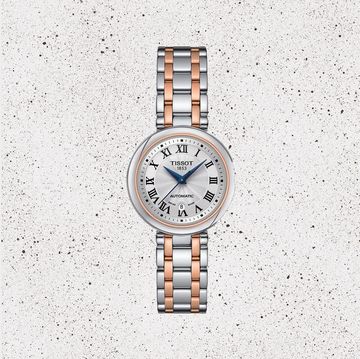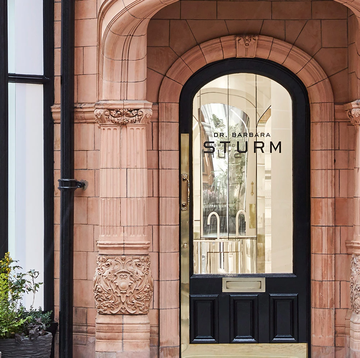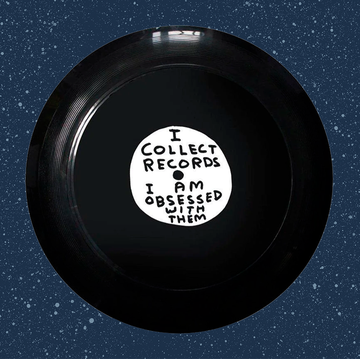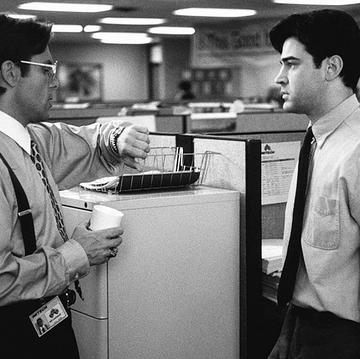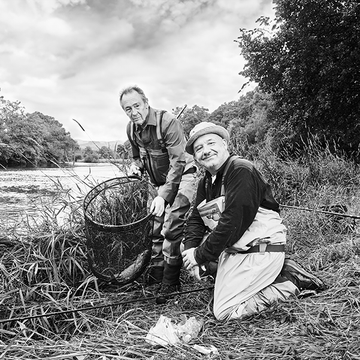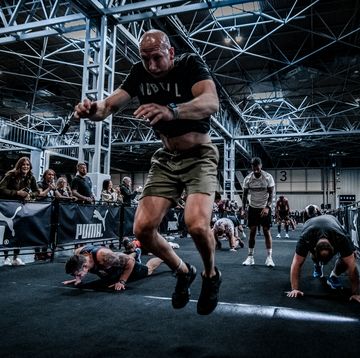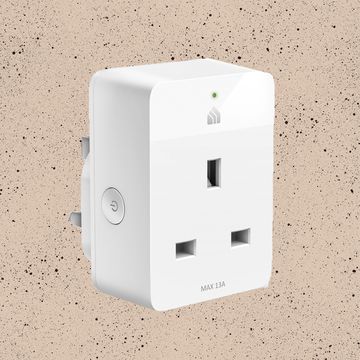You'd be surprised how many people ask me about my crotch. It's a lot. I have had people ask me which "parts" I have, how they look, what I plan to do with them. I don't run around with a sign that says "ask me about my crotch," but as soon as I bring up my gender identity to certain people, all of a sudden it appears on the discussion table like a highly inappropriate Seamless order. Yes, even in New York. Yes, even among seemingly "progressive" people. And it stems from the fact that most people you meet simply do not know much about non-binary gender identities. It usually goes like this:
"So you don't feel like a boy or girl?"
"Exactly."
"But you wear makeup."
"Yeah."
"But you're not a woman."
"Nah."
"...Huh."
I have had this exact conversation at least once a week, every week since coming out publicly in November. It's not one I mind; it just gets repetitive, and occasionally a little insulting if the conversation leads to questions like, "So you're just trying to be different?" With trans visibility increasing more quickly than ever, non-binary gender identity is coming into focus, too.
And it's often misunderstood.
On Tuesday, The New York Times Magazine published a brief etymology of the words "they" and "them" as pronouns for people who identify as genderqueer, genderfluid, agender, gender-noncomforming, and other genders. The piece is another stride in acknowledging those who do not feel they fit on the current male/female binary—and another piece in the growing conversation surrounding gender in society.
As someone who identifies with gender-neutral pronouns, I was amped to see the Times bring the discussion onto the radar of readers who may not know there are even people out there who don't identify as male or female. I've been out for four months, but I've known I'm not cisgender for the last five or so years (probably longer, if I'm honest, depending on how you interpret some odd childhood habits).
Here are some of questions I've frequently been asked since coming out:
Aren't you just born with your gender?
While gender and sex are frequently used interchangeably, the two do not mean the same thing. Your sex relates to your biology, both physiological and anatomical, which often influences how you're treated in society (example: the enforcing of gender roles), but it is not the same as gender.
According to the World Health Organization, gender is "the socially constructed characteristics of women and men." It goes on to emphasize the importance of sensitivity to "different identities that do not necessarily fit into binary male and female sex categories."
What's the difference between a non-binary and a binary identity?
The gender binary separates those who identify as male or female, simple as that. Non-binary genders, however, don't fit neatly within these two—they can be a combination of male and female, a fluid back-and-forth, or totally outside of the binary. Cisgender people, on the other hand, are folks whose identities align with the gender they were assigned at birth.
Note: "Non-binary" is an imperfect catchall for any gender outside of female and male, but it's what I'll primarily use in this rundown for simplicity's sake.
Does this mean you don't look female or male?
A common misconception is that all non-binary people are androgynous, but that isn't the case. The way you present yourself (gender expression) and the way you identify can be connected, but they are not necessarily dependent on one another.
I do not identify as a woman, but the above photos show you that I present fairly feminine, meaning most people assume I am a cisgender woman until I inform them otherwise. I keep my hair long because I prefer a lob cut. I don't shave my legs. I wear dresses once in a while, and I play with makeup every day because it's literally my job (I'm the Beauty Editor of GoodHousekeeping.com).
At the same time, I know people who identify as genderqueer, agender, genderfluid, and non-binary who have beards and wax their legs. I know others who sculpt their faces with makeup and prefer suits. I know some who wear no makeup at all and prefer short hair—all sorts of expressions that depend wholly on the individual.
Are non-binary people considered transgender?
There's actually not a standardized answer for this. While non-binary people often get shuffled into the transgender category, some people who are non-binary do not identify as transgender, while others do.
Does this mean you're gay?
Nope. Your sexual orientation and your gender identity are separate. A transwoman who dated primarily women earlier in life would not necessarily start being attracted to men simply because she had come out as a woman. I'm queer and attracted to people of various genders—and have, in fact, dated several straight-identifying people.
How do I know which pronouns to use for someone?
Ask! It's the quickest and most reliable way to determine someone's pronouns. I like to keep mine in my Twitter bio for visibility. Some people use they and them, like me, while others use ze and zir, xe and xem, or ze and hir. There are so many alternatives. Some non-binary people simply utilize he and him or she and her, too, so again, it's always best to ask.
But how do you use "they," "their," and "they" in reference to a single person?
Using these words can feel a little odd at first. When I came out to my team at work, I gave them examples to clarify how my preferred pronouns are used to make the transition easier.
Example 1: Catherine is a great musician, they should start a band.
Example 2: I can't get a hold of Jesse—can somebody call them for me?
Example 3: Peter loves their dog so much.
That sounds like a lot of work. Can't we just use the old ones?
Yeah, nah. It's really not difficult, and it's pretty annoying when people claim it is.
Imagine your name is Jack, but every time your boss speaks to you, they call you Jim, or Jennifer, or James. Or if you're a man and someone keeps calling you "Mrs." It may feel uncomfortable, or at least inaccurate. It's equally, if not more, frustrating to be constantly labeled as somebody else with regard to gender, so it's very helpful when people actually listen and act respectfully. If you can learn somebody's name, you can learn their pronouns.
What if I mess up and call someone the wrong pronoun?
Do your best! It can and will be initially awkward to misgender someone, but putting in effort to learn and get accustomed to a person's preferred pronouns is the best way to show you respect their identity.
So...which bathroom do you use?
Well, I would prefer to safely use whichever one is most readily available, as would most people, though certain lawmakers and general assholes would love to see that outlawed. When forced to choose between a men's room and a women's room, I typically use the women's restroom because it's the one that will garner the least amount of attention, negative or otherwise.
Everyone is different, of course, but the general consensus is that trans and non-binary people would just like to use the bathroom, period, with no bullying, threats of violence, or laws imposing our ability to do so.
Is it ever okay to ask non-binary people about "which parts" they have?
Just gonna go with a hard "no" on this one, though it's shocking how many people think it's okay to ask someone about what's going on in their pants. It would be weird if someone at a party spontaneously asked you about your junk, right? So maybe don't ask your trans and non-binary friends and acquaintances what's up with theirs. Thanks in advance.




